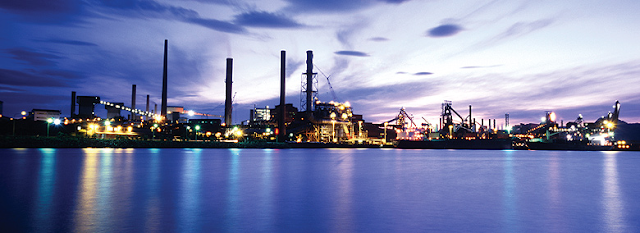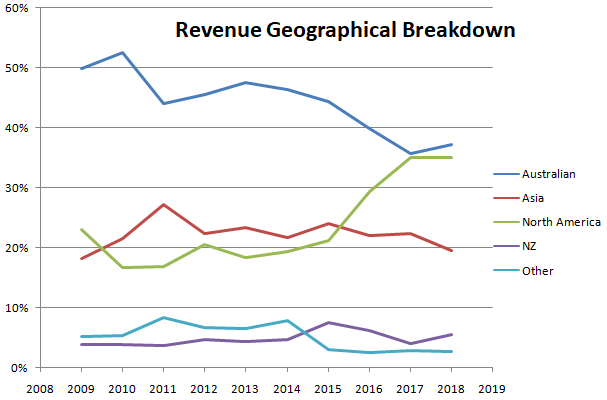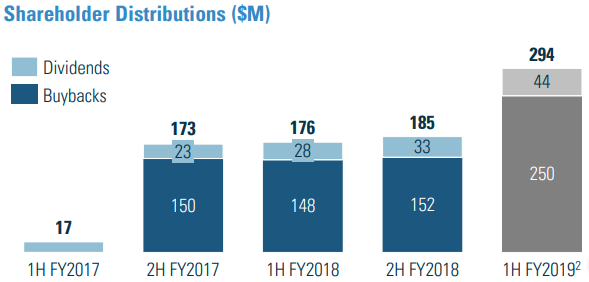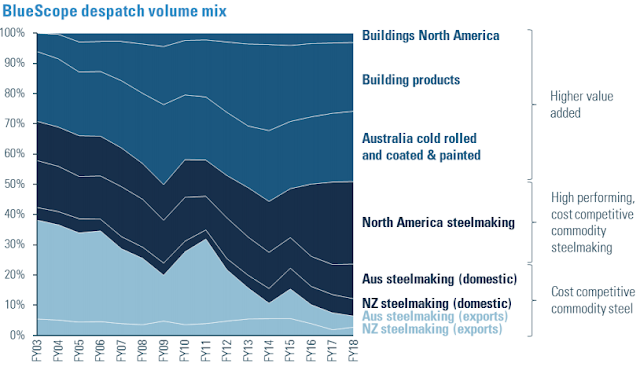BlueScope Steel an excellent Value Company (ASX:BSL)
 |
| Port Kembla Source: www.bluescopesteel.com.au |
Trav Mays
Follow @MaysTrav


Description
BlueScope Steel (ASX:BSL) is a “global leader in premium
branded coated and painted steel products - the current largest manufacturer of
painted and coated steel products globally”. BlueScope has 5 major segments,
Australian Steel Products, North Star, Building North America, NZ & Pacific
Steel and Building Products Asia & North America. These segments are spread
out over 17 countries with more than 100 facilities and 14,000 employees.
Whilst having a large array of brands under the BlueScope banner, their main
brands are Colorbond, Clean Colorbond and Zincalume steels, Lysaght steel
building products and Butler and Varco Pruden engineered buildings.
History
BlueScope listed on the ASX on 15th July 2002 after it
split off from BHP and as with many manufacturing companies, it has had a
turbulent ride since then. The share price initially increased from the IPO
price of $11.14 to just over $48 in 2007, before falling to a low of $1.6 in
2012. The effects of the Global Financial Crisis were extended for BlueScope, as the
global economy contracted, the iron ore price increased by an astronomical
amount, from below $40/tonne in 2007 to over $180/tonne in 2010. These high
coal prices along with a strong Aussie dollar and low steel prices lead
Bluescope to post over a billion dollar loss in 2011.
To combat this, Bluescope ceased all exports from their Port
Kembla Mill, resulting in ~800 employees being stood down and a further 200
jobs being lost at the Western Port Steel Mill. Macro conditions improved over
the coming years, however Bluescope continued to struggle to make a profit with
the 90 year blast furnace at Port Kembla, again considering shutting it down in
2015. It was during these deliberations that Bluescope expanded further into
America, purchasing the remaining 50% of the North Star Mill, taking their
control to 100%. This increased their percentage of non-current assets in America from 17%
to 44%. This formed part of
a strategic move away from Australia, beginning in 2010, Bluescope began to
expand into New Zealand, Asia and America, almost halving their percentage of
non-current assets in Australia, 63% in 2010 to 36% in 2017.
The movement of assets translated into a movement of their revenue base. Revenue sourced from Australia reduced from 53% in 2010 to 37% in
2018, whilst in America it went from 17% to 35%.
One of the largest costs facing Australia at the moment is
electrical costs. BlueScope always looking to the future and for potential
opportunities, has entered into the largest solar Power Purchase Agreement with
ESCO Pacific and Schnider Electric. The 7 year agreement will supply roughly
20% of BlueScope Australia’s Electrical requirements, taking most of the 133MW
output of the Finley Solar farm, located 100km west of Albury.
Competition
The 2017 acquisition of Liberty Onesteel would have been an excellent
opportunity to price BlueScope, however as it was purchased by the private
conglomerate GYG Alliance, the price they paid has been kept a secret.
Nevertheless, BlueScope has many other competitors for comparison, especially with
their further expansion into North America.
As you can see
below, using a number of the common value metrics, BlueScope is by far the better purchase
at current prices. BlueScope is not only ranked the overall best but has the best
values in 7 out of the 11 categories and isn’t last in any of them. US Steel
scored the second lowest, however the difference was still 10 points higher
with the rest scoring double or more than BlueScope. From a business perspective, BlueScope has the highest profit margin and lowest Debt/Equity. In fact, they are
actually net cash positive, with $63 million in cash left after paying off all
of their debt.
The similar Pitroski score shows that the gain in 2018 was
seen across the industry and therefore was a result of outside influences, iron
ore prices, steel prices, Trump’s election and protectionism etc. We therefore
cannot allow the Pitroski score to have much of an impact on the eventual
decision. It also needs to be said, that as a large number of these metrics are
related to price, the lower share price of BlueScope will cause this type of analysis
to favour BlueScope. The cause for the large decrease in share price needs to be
further examined before a final decision can be made.
Evaluation
On a comparison basis, BlueScope is by far the superior steel
manufacturer, however just because it is has scored the best, does not mean
that it is currently mispriced enough to warrant purchase, especially when
taking into consideration the need for a sizeable margin of safety.
Joel Greenblatt made the enterprise value (EV) multiple a
popular analysis technique. By using the average industry and historical
multiples, you can compare the current price with those paid historically and
industry wide. Using the industry average EV multiple of 6.56 results in a BlueScope's share price of $22.6 a 104% increase on current prices, whilst using BlueScope’s 5
year average gives an increase of 83% to $20.27/share. The returns are of
considerable size, however as with all evaluation techniques, these are just a
small component of the overall analysis. The reason for the downbeat share
price needs to be thoroughly investigated.
While share price increases will make up the bulk of any
gains you make once purchasing a business, the total return to the shareholder
including dividends and buybacks is more important. BlueScope has tendered to buyback
shares, which for a long term investor, assuming that the share price during
the buyback is trading below its intrinsic value (read excellent commentary
about that here),
is the best use of a company’s excess capital. BlueScope returned ~22% of its 2018
profits and is set to continue returning value to share holders, having already
begun another $250 mill buyback.
Possible Causes of the Current Share Price
Despite BlueScope earning a large profit, the share price has been
falling from a high of $18.60/share to 52 week lows of $10.56/share.
The potential causes of which are huge, from the dreaded and
unpredictable “tweet” risk to the low AUS/US exchange rate. Below is a list of
potential risks that I believe could have the biggest impact and are therefore
causing the share price to fall.
-
US/The world trade tensions
-
Tweet risk
-
AUS/US exchange rate
-
Trump risk
-
Unstable Australian Government
-
Iron Ore prices
-
Steel Prices
-
China
-
New CEO
-
Global Recession
As you can see, a
large number of these are not BlueScope specific risks but global risks, with the
Trump risk helping to increase short term US profits through tariffs.
The low AUS/US exchange rate, whilst at one stage would have
had a much larger impact on the Bluescope, has been somewhat mitigated by their
global expansion. As you can see below, Bluescope has decreased the Australian
Steelmaking exports significantly, resulting in the exchange rate only significantly
affecting the cost of internationally sourced or US priced inputs for
Australian manufacturing. The low AUS/US exchange rate will have a positive
effect on the US operations when converted to $AUS.
The appointment of Mark Vassella as CEO was an excellent
choice, given his vast steel industry experience, especially within the US
market. I don’t believe this is having an effect. In fact, it’s my opinion that
it is the uncontrollable effects that are pushing the share price down. The
uncertainty of Trump and the US/China trade negotiations are having a roll on
effect into the iron ore and steel prices. I believe it is these risks that are
causing investors to currently be cautious. Along with this, as with all
industries, China is an ever present behemoth with the ability to create
further chaos for the steel industry. A Chinese economy stimulation package
involving steel production, could cause a large drop in the steel price whilst
increasing the iron ore price; this would obviously have a large impact on
BlueScope. With all the uncertainty a margin of safety is paramount to an
investor’s long term success.
Recommendation
BlueScope Steel, is an excellent example of a value company,
however the reason for the low share price could be warranted. A good
understanding of the major risks is extremely important to facilitate a
realistic risk reward analysis. Fundamentally, whether an Investor chooses to
invest in BlueScope will come down to their global economy outlook. If you are
optimistic, the future is bright, tensions will ease and stability will resume.
However if you are pessimistic, than I would suggest looking elsewhere for an
investment opportunity. I tend to believe the actual outcome will be somewhere
between the two, but more towards the optimistic side of the spectrum. As with
most people I can’t predict the future (read more about that here), I do however
believe it’s time to begin thinking about Warren Buffett’s quote "Be fearful when others are
greedy and greedy when others are fearful".
As a business, BlueScope has very little debt, a global
presence, is net cash positive, ranks higher than other major competitors, is
run by an excellent management team and recently confirmed their 1H 2019
underlying EBIT guidance of 10% higher than 2H 2018 ($745M). They have learnt
from the most recent recession and have reduced their exposure to a given country.
It is due to all of this that I believe that BlueScope Steel will prove to be
an excellent long term investment.
Thanks for reading
Just Culture Investor
Trav Mays
The author is a current owner of a portion
of BlueScope Steel, given this, they may be subject to one or a number of
biases, more specifically anchoring and/or confirmation bias. This article is
neither general nor personal advice and in no way constitutes specific or
individual advice. The website and author do not guarantee, and accept no legal
liability whatsoever arising from or connected to, the accuracy, reliability,
currency or completeness of any material contained on this website or on any
linked site. This website is not a substitute for independent professional
advice and users should obtain any appropriate professional advice relevant to
their particular circumstances. The material on this website may include the views
or recommendations of third parties, which do not necessarily reflect the views
of the website or author, or indicate its commitment to a particular course of
action








